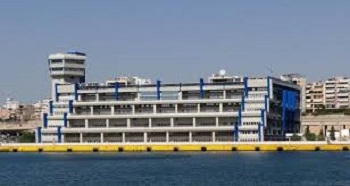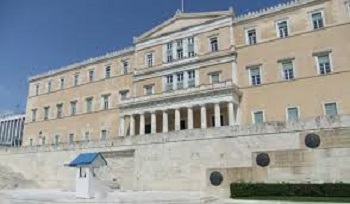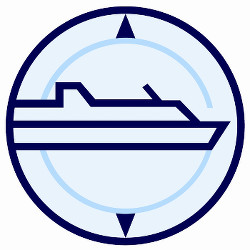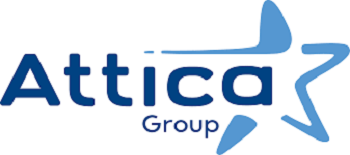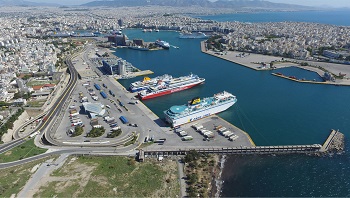Προκήρυξη Μειοδοτικού Διαγωνισμού
Προκήρυξη Αρχικού Μειοδοτικού Διαγωνισμού για την Εξυπηρέτηση Δρομολογιακών Γραμμών με σύναψη Σύμβασης ή Συμβάσεων Ανάθεσης Δημόσιας Υπηρεσίας διάρκειας από 01/11/2021 μέχρι 31/10/2022 για τις συμβάσεις ενός έτους ή μέχρι 31/10/2023 για τις συμβάσεις διετούς διάρκειας.
Δείτε αναλυτικά την προκήρυξη εδώ.
Πρόσκληση Συνεδρίασης Συμβουλίου Ακτοπλοϊκών Συγκοινωνιών
Τη Δευτέρα 5 Ιουλίου 2021 και ώρα 10:00 π.μ. θα πραγματοποιηθεί η συνεδρίαση του Συμβουλίου Ακτοπλοϊκών Συγκοινωνιών μέσω τηλεδιάσκεψης.
Δείτε αναλυτικά την πρόσκληση και τα θέματα της ημερήσιας διάταξης.
Δημοσίευση ΦΕΚ 2744 Β' / 26.6.2021
Στο ΦΕΚ 2744/Β/26-6-2021 δημοσιεύθηκε η ΚΥΑ αριθμ. 39842: «Έκτακτα μέτρα προστασίας της δημόσιας υγείας από τον κίνδυνο περαιτέρω διασποράς του κορωνοϊού COVID-19 στο σύνολο της Επικράτειας για το διάστημα από τη Δευτέρα, 28 Ιουνίου 2021 και ώρα 6:00 έως και τη Δευτέρα, 5 Ιουλίου 2021 και ώρα 6:00».
Αναζητήστε το ΦΕΚ (Τεύχος Β’, Αριθμός 2744, 26.6.2021) εδώ.
Δημοσίευση ΦΕΚ 2742 Β' / 25.6.2021
Στο ΦΕΚ 2742/Β/25-6-2021 δημοσιεύθηκε η ΚΥΑ αριθμ. 39840: «Προϋποθέσεις εισόδου στη χώρα προς περιορισμό της διασποράς του κορωνοϊού COVID-19».
Αναζητήστε το ΦΕΚ (Τεύχος Β’, Αριθμός 2742, 25.6.2021) εδώ.
Δημοσίευση ΦΕΚ 2661 Β' / 18.6.2021
Στο ΦΕΚ 2661/Β/18-6-2021 δημοσιεύθηκε η ΚΥΑ αριθμ. 38199: «Προϋποθέσεις εισόδου στη χώρα προς περιορισμό της διασποράς του κορωνοϊού COVID-19».
Αναζητήστε το ΦΕΚ (Τεύχος Β’, Αριθμός 2661, 18.6.2021) εδώ.
Δημοσίευση ΦΕΚ 2660 Β' / 18.6.2021
Στο ΦΕΚ 2660/Β/18-6-2021 δημοσιεύθηκε η ΚΥΑ αριθμ. 38197: «Έκτακτα μέτρα προστασίας της δημόσιας υγείας από τον κίνδυνο περαιτέρω διασποράς του κορωνοϊού COVID-19 στο σύνολο της Επικράτειας για το διάστημα από το Σάββατο, 19 Ιουνίου 2021 και ώρα 6:00 έως και τη Δευτέρα, 28 Ιουνίου 2021 και ώρα 6:00».
Αναζητήστε το ΦΕΚ (Τεύχος Β’, Αριθμός 2660, 18.6.2021) εδώ.
Επιστολή ΣΕΕΝ - Απεργία ναυτεργατικών σωματείων 16.6.2021
Επιστολή του Συνδέσμου Επιχειρήσεων Επιβατηγού Ναυτιλίας προς την ηγεσία του Υπουργείου Ναυτιλίας και Νησιωτικής Πολιτικής, την Τετάρτη 16 Ιουνίου 2021, με θέμα “Απεργία ναυτεργατικών σωματείων 16.6.2021” :
“Σήμερα 16 Ιουνίου με πρωτοβουλία των ναυτεργατικών σωματείων άτομα τα οποία δεν είναι ναυτικοί ή επιβάτες συγκεντρώθηκαν στους προβλήτες και στους καταπέλτες των ακτοπλοϊκών πλοίων, με αποτέλεσμα να μην πραγματοποιηθούν τα προγραμματισμένα δρομολόγια από Πειραιά και Ραφήνα.
Σημειώνουμε ότι η απεργία η οποία κηρύχτηκε από τα ναυτεργατικά Σωματεία για την 16/6 κρίθηκε παράνομη και τα πληρώματα των πλοίων δεν απεργούσαν, όπως εξάλλου αποδεικνύεται από την κανονική εκτέλεση όλων των δρομολογίων από λιμάνια στα οποία δεν υπήρξε παρακώλυση των συγκοινωνιών, όπως πχ από το Λιμάνι του Βόλου και όλων των δρομολογίων προς Πειραιά και Ραφήνα.
Η τήρηση της τάξης για την οποία είναι επιφορτισμένο το ΛΣ υπήρξε ανύπαρκτη και απ΄ ότι γνωρίζουμε δεν υπήρξαν και οι σχετικές εντολές.
Φαινόμενα παρακώλυσης των συγκοινωνιών με τις εξαγγελθείσες απεργίες να έχουν κηρυχθεί παράνομες παρουσιάστηκαν :
- Στις 16/6/2021, απεργία των ναυτεργατικών σωματείων.
- Στις 10/6/2021, απεργία των ναυτεργατικών σωματείων.
- Στις 3/6/2021, απεργία της ΠΕΝΕΝ (με σημαντικές καθυστερήσεις στην αναχώρηση των πλοίων).
- Στις 2/10/2019, απεργία των ναυτεργατικών σωματείων ΠΕΝΕΝ, ΠΕΜΕΝ, ΣΤΕΦΕΝΣΩΝ, ΠΕΕΜΑΓΕΝ.
- Στις 24/9/2019, απεργία της ΠΝΟ.
Η κατάσταση η οποία έχει δημιουργηθεί είναι εξαιρετικά επικίνδυνη καθώς οποιοδήποτε σωματείο ή ακόμα και ομάδα ατόμων μπορούν χωρίς κανέναν έλεγχο να παρενοχλήσουν τις αναχωρήσεις των πλοίων μας. Οι ανεξέλεγκτες αυτές αυθαιρεσίες δημιουργούν και θα δημιουργήσουν στο μέλλον προβλήματα στην εκτέλεση των δρομολογίων μας, εν μέσω μιας τουριστικής περιόδου ιδιαίτερα προβληματικής όπου κάθε επιβάτης είναι πολύτιμος για τα νησιά μας.
Με αυτές τις επισημάνσεις και προβληματισμούς παρακαλούμε για μια ακόμα φορά για τη λήψη μέτρων επιτήρησης των λιμανιών μας για να αποτραπούν στο μέλλον παρόμοια φαινόμενα, τα οποία μπορούν να προκαλέσουν σοβαρές ζημιές στην ομαλή εξυπηρέτηση επιβατών και οχημάτων και βέβαια στην τροφοδοσία των νησιών, η οποία είναι ιδιαίτερα σημαντική και απαραίτητη την καλοκαιρινή περίοδο”.
ATTICA GROUP - Δελτίο Τύπου 16.6.2021
Η Attica Group, μητρική εταιρεία των SUPERFAST FERRIES, BLUE STAR FERRIES και HELLENIC SEAWAYS, με ιδιαίτερη ικανοποίηση ανακοινώνει τη βράβευσή της με 4 βραβεία στα Health & Safety Awards 2021 που διοργανώθηκαν από την Boussias Communications.
Δείτε αναλυτικά εδώ.
Κίνηση επιβατών 2018-2019-2020
| ΑΚΤΟΠΛΟΪΚΕΣ ΓΡΑΜΜΕΣ | 2018 | 2019 | 2020 |
| ΑΡΓΟΣΑΡΩΝΙΚΟΣ | 2.461.766 | 2.437.938 | 1.252.141 |
| ΠΕΙΡΑΙΑΣ - ΠΕΛΟΠΟΝΝΗΣΟΣ | 33.295 | 54.874 | 39.238 |
| ΠΕΙΡΑΙΑΣ - ΚΡΗΤΗ | 1.847.595 | 1.981.814 | 1.002.440 |
| ΠΕΙΡΑΙΑΣ - ΚΡΗΤΗ - ΔΩΔΕΚΑΝΗΣΑ | 165.173 | 171.088 | 68.859 |
| ΠΕΙΡΑΙΑΣ - ΔΩΔΕΚΑΝΗΣΑ | 755.088 | 800.407 | 485.860 |
| ΠΕΙΡΑΙΑΣ - ΔΥΤΙΚΕΣ ΚΥΚΛΑΔΕΣ | 849.311 | 847.704 | 527.341 |
| ΠΕΙΡΑΙΑΣ - ΑΝΑΤΟΛΙΚΕΣ ΚΥΚΛΑΔΕΣ | 2.547.164 | 3.153.328 | 951.820 |
| ΠΕΙΡΑΙΑΣ - ΜΥΚΟΝΟΣ - ΤΗΝΟΣ - ΣΑΜΟΣ | 1.179.519 | 1.099.416 | 699.457 |
| ΠΕΙΡΑΙΑΣ - ΧΙΟΣ - ΜΥΤΙΛΗΝΗ | 518.967 | 503.898 | 294.092 |
| ΠΑΤΡΑ - ΑΚΑΡΝΑΝΙΑ - ΙΟΝΙΑ ΝΗΣΙΑ | 527.591 | 518.982 | 310.198 |
| ΡΑΦΗΝΑ - ΕΥΒΟΙΑ - ΑΝ. ΚΥΚΛΑΔΕΣ | 2.661.573 | 2.494.719 | 934.050 |
| ΒΟΛΟΣ - Β. ΣΠΟΡΑΔΕΣ - ΚΥΜΗ | 824.572 | 850.238 | 432.143 |
| ΚΥΛΛΗΝΗ - ΠΟΡΟΣ ΚΕΦΑΛΛΟΝΙΑΣ |
480.926 | 547.231 | 296.967 |
| ΖΑΚΥΝΘΟΣ - ΚΥΛΛΗΝΗ | 1.094.006 | 1.096.001 | 486.616 |
| ΛΟΙΠΕΣ ΓΡΑΜΜΕΣ | 2.515.417 | 2.262.331 | 1.110.501 |
| ΣΥΝΟΛΟ | 18.461.963 | 18.819.969 | 8.891.723 |
*Πηγή: ΕΛΣΤΑΤ
Διακίνηση επιβατών - Δ' τρίμηνο 2020
Η Ελληνική Στατιστική Αρχή (ΕΛΣΤΑΤ) ανακοίνωσε την Τετάρτη 16 Ιουνίου 2021 τα αποτελέσματα διακίνησης επιβατών, εμπορευμάτων και κινητών μονάδων στους Ελληνικούς λιμένες του Δ’ τριμήνου 2020.
Αναλυτικά στοιχεία μπορείτε να δείτε στο σχετικό Δελτίο Τύπου που εξέδωσε η ΕΛΣΤΑΤ.
Δείτε επίσης σύγκριση της κίνησης των επιβατών μεταξύ των ετών 2018-2019-2020.
